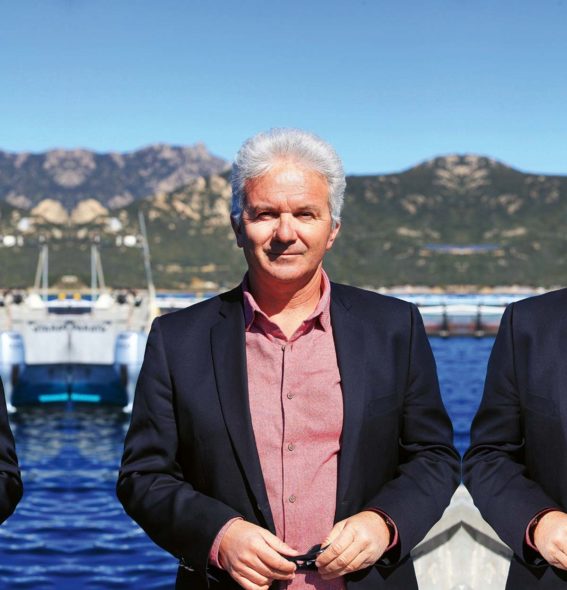EMGI decided to join AquaIMPACT consortium to find best solutions to some of the current challenges in European sea bass farming. Philippe Riera: “Two challenges motivated us to join AquaIMPACT consortium.
The first goal in AquaIMPACT: Impact of feed raw materials and genetics on disease resistance
The first question to answer was whether the evolution of feeds with more and more plant-based raw materials will allow full expression of genetic progress achieved so far, and whether the feed evolution impacts susceptibility of sea bass against vibriosis disease.
To study this, we used families produced and phenotyped in the previous EU project (PerformFish). The families were fed with a commercial diet and an innovative and equilibrated diet highly substituted in vegetal ingredients formulated by Dr. Izquierdo from Las Palmas University and produced by the feed factory of the Nireus company. These families were challenged to Vibrio harveyi at the ANSES-SYSAAF platform. The fish were genotyped with the 57k SNP chip.
This highly innovative approach combining nutrition and genomic information provided us original information about our breeding program. Feed substitution with vegetal ingredients and equilibrated feed will allow our clients to benefit from the genetic progress of a breeding program, as no or very limited changes in family re-ranking were observed for resistance to Vibrio. This is a very interesting result demonstrating that our progress with genetics is not impacted by the evolution of feeds, when feeds are well designed.
The second goal in AquaIMPACT: Genetic progress of the breeding program
The second challenge was to estimate scientifically the amount of genetic progress in sea bass performance that we have achieved by investing in selective breeding. We were not interested only on the selected production traits, but also on the potential correlated genetic responses in immunology, feed efficiency, physiology, gut microbiome and flesh quality.
To assess the genetic progress, we provided sea bass sperm from our last generation of selection to Ifremer (at Palavas) that crossed them with oocytes from their females that were also fertilized with sperm from wild males.
The comparison of the two fish groups confirmed our commercial results reported by our clients. The selected fish had 35-40 % better growth when compare to the wild genotype, which means 2-3 months shorter production cycle to reach 300 g body weight. The experiment also reported that distal gut integrity was improved in our selected line without impact on gut microbiota.
The first results on Vibrio and genetic progress have been reported at the EAS conference in Madera in October 2021. Additional information on immunological barriers, and impacts of specific nutritional anti-stress products, are still to be reported”
What are the foreseen benefits of AquaIMPACT work for the company?
“AquaIMPACT provides us a unique opportunity to estimate scientifically for the first time the outcomes of our pioneering, long-term investments in selective breeding and domestication of European sea bass. Major positive results now confirm that science can help us in improving performance and robustness of our fish.”
What is your vision for aquaculture in 2040: What has changed?
“We believe in sustainable and high quality aquaculture production systems. Genetic selection is one of the focal tools which will help aquaculture industry to achieve such goals by 2040.”
What is the best part of the interaction between research institutes and companies?
“These interactions allow us to benefit from the latest technology and knowledge. This is, as the project is still running, a very fruitful opportunity for high level discussions with the best scientist and competitors. AquaIMPACT project has been us a great opportunity to develop collaboration with researchers in genetics and in nutrition (Ifremer, SYSAAF, Las Palmas University).”
| Who’s writing?
|

 The founder and CEO, Philippe Riera, promotes within Gloria Maris Group the importance of food and health issues. This makes Gloria Maris Group a committed national leader for which all actions, projects and ambitions are driven by four key-words: Quality, Excellence, Competences and Respect of the environment. In fact, since 1992, Philippe Riera promotes practices in which animal welfare as well as the environment are the priorities. In the farms in Corsica, Noirmoutier or in Gravelines, turbots, labelled meagre, gilthead sea bream and conventional and organic sea bass grow and swim freely according to their own natural growth cycles.
The founder and CEO, Philippe Riera, promotes within Gloria Maris Group the importance of food and health issues. This makes Gloria Maris Group a committed national leader for which all actions, projects and ambitions are driven by four key-words: Quality, Excellence, Competences and Respect of the environment. In fact, since 1992, Philippe Riera promotes practices in which animal welfare as well as the environment are the priorities. In the farms in Corsica, Noirmoutier or in Gravelines, turbots, labelled meagre, gilthead sea bream and conventional and organic sea bass grow and swim freely according to their own natural growth cycles.